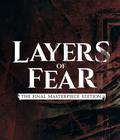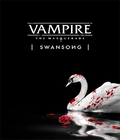Vampire: The Masquerade – Swansong is set Boston. The Vampire Courts have recently come under the leadership of Prince Hazel Iverson. To solidify her rulership, the Prince has been working to broker a peace between two vampire factions. No sooner does the day of the celebration arrive than a Code Red goes out: Vampires have been compromised and may need to flee the city. With most of the vampire population on lockdown and something having happened to the party, Hazel is forced to put her trust in three unlikely allies: Emem, a nightclub-owning, politics-hating vampire; Galeb, an elite blueblood with a talent for doing things that need to be done; and Leysha, a half-mad prophet who refuses to go anywhere without her daughter.
One thing I feel really sets apart Swansong from other Vampire games I've played is that it emphasizes the non-combat elements of the game. Yes, your vampires are unbelievably deadly supernatural beings, but maintaining the masquerade is critical to success. Internal politics, solving mysteries and finding vital clues all are far more significant to the overall game. As such, the title has more in common with an adventure offering than an action game, but it still has enough RPG mechanics to keep it from feeling just like an adventure game.
You have the chance to build your character's stats and abilities with the Vampire: The Masquerade stats system, and these choices play into how each character functions. You can choose from three default templates (Investigator, Jack-of-all-Trades, or Veteran) or customize the stats yourself. You do this by investing in both skills and special vampiric powers. The more you invest in something, the more you can get out of it, and the lower your costs and consequences are. There are many different skills available, such as psychology, education, persuasion or deduction, which all open up new paths or new ways to gain information.
Each character has specialties that are connected to their vampiric heritage. Emem can focus on becoming lightning quick or use her natural gift for reading people to make it easier to dominate and control them. Galeb is more of a physical powerhouse who can brute-force minds or bodies alike, though he is plenty capable of being subtle and sneaky. Leysha is a master of deception and can turn herself invisible, steal the clothes or even identity of other characters, and get premonitions and psychic flashes.
At the end of the day, it is up to the player to decide how each character functions. There don't seem to be any useless skills, but what you invest in determines the available options. For example, investing in Leysha's doppelganger abilities can grant access to places and information you normally wouldn't have, but they might require you to have a better Deduction or Education skill to get the most out of what you find. On the other hand, investing in her psychic abilities can provide lots of shortcuts at a greater cost to your humanity.
Abilities in Swansong are governed by two meters: Willpower and Hunger. Willpower can be used in certain interactions to overcome someone's natural resistances. Every character has their own stat set, and being able to overcome their talents is a necessary part of getting what you need. When you need to use a non-vampire skill in conversation, you need to make an opposed challenge to the enemy's stat. Higher stats mean a better chance of victory, and lower stats mean a greater chance of failure. This makes it important to invest in good stats.
An added wrinkle to this is the ability to Focus. By Focusing, you can spend more willpower to temporarily upgrade your skill by multiple levels. However, enemies can also do this, and an enemy's likelihood of Focusing depends on how hard you push. Push too hard, and an enemy will raise their own stats and waste all your precious Willpower. You can get a rough idea of how likely it is this will happen, but it still requires careful balance. Using a skill frequently also earns you a bonus that gradually builds and increases your chance of success.
On the other hand, hunger fills as you use vampiric powers or are put in situations where your inner beast gets hungry (such as a blood-splattered murder scene). The more it increases, the harder it is to stay calm and collected. You'll get bonuses to your mental skills at lower hunger, but you can be more intimidating at higher levels. Let it go too far, and you can lose control, and that leads to very bad things indeed.
To quell your hunger, you need to feed. To feed, you need to find a safe zone (an area no human is going to wander in to willingly) and a victim who you can lure to said zone. Once you do, you can engage in the Feeding minigame, where you need to hold down the F key to "feed," which quickly fills up a bar. The closer you get to the edge of the bar without stopping, the more hunger you sate. If you go beyond it, you'll kill the person you are feeding on, which increases suspicion and makes both friend and foe look more negatively upon you. On the plus side, killing your prey gets you the most blood. You can even feed upon a living victim a second time, but doing so does kill them. If it's a choice between that and going berserk, you have little option. Whoever you feed on can also impart some of their knowledge; that grants you a bonus at the end of a mission, but you only keep the bonus of the last person you fed on.
Another neat feature is Traits. You gain positive or negative traits (temporary and permanent) based on what you do. Traits can be gained from successful actions and failures, and they can grant bonuses or penalties. For example, the first one you get in the game comes from attempting to dominate a superior vampire. You fail, but you gain the knowledge to reduce the experience cost for leveling your powers of domination. This makes it more worthwhile to try and fail. Even if you mess up, you can gain something from it.
This makes Swansong an enjoyable experience of managing various skills and resources to get what you need. There are multiple outcomes to each area, and while quite a few things are static, you can make some pretty significant changes. With good resource management, you can find clues or paths that you didn't see before. Some valuable information can be obtained at a cost. I don't want to spoil anyone's experience, but never assume you've found everything until you've checked every nook and cranny.
That said, the game was a bit buggy. There were moments when events didn't trigger properly, or I found cut scenes blocked off by geometry in the environment. I also fell through the world more than once, including a frustrating occasion where I lost all my progress at the very end of a level because it auto-saved after I fell through the floor. It's very possible many of these issues will be patched upon release, but it was a sour spot on a game that I was otherwise enjoying.
The game doesn’t look terrible, but it isn't very impressive, either. The environments are nicely crafted and detailed, but the character animations often look a bit stiff. Many characters have a dead-eyed "staring into nothing" conversation pose that reminds me of early Bioware games. It doesn't ruin the game, but it detracts from some scenes. Thankfully, the voice acting is largely good, with a few notable exceptions. One young child character is utterly intolerable, and unfortunately, she's around pretty often.
Vampire: The Masquerade – Swansong is a really engaging romp into the world of the masquerade. I really appreciate that it focuses on the less combat-oriented elements of the tabletop game, something almost every title in the franchise puts on the backburner. Some glitches and a relatively unimpressive presentation drag it down a little, but if you were looking for something focused more around politics and investigation instead of tearing people in two, Swansong is the game for you.
Score: 8.0/10
More articles about Vampire: The Masquerade - Swansong













 Vampire: The Masquerade - Swansong aims to define a new genre: the narrative RPG, inspired by the rules of the tabletop RPG.
Vampire: The Masquerade - Swansong aims to define a new genre: the narrative RPG, inspired by the rules of the tabletop RPG.














